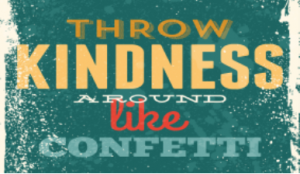kind • ness noun
the quality of being friendly, generous, and considerate
the quality of being friendly, generous, and considerate
Be kind. These two simple words composed one of my three classroom rules when I was a preschool teacher. But how simple truly is kindness, and what is its value? The Dalai Lama, the head of Tibetan Buddhism, perfectly articulates the simplicity of kindness in his following statement: "There is no need for temples; no need for complicated philosophy. Our own brain, our own heart is our temple; the philosophy is kindness."
Kindness is an innate human trait that can be cultivated in all hearts; it is not an act performed by children and adults that have been taught to behave properly. Even infants can be seen displaying acts of kindness when they encounter someone in distress. If infants innately react to those around them with kindness, why does the world seem to be so cruel? It is possible that the answer lies in a paradigm shift that happens when people have an unhealthy focus on their own personal happiness? As we get older, we understand the value of balance and sometimes wonder if it is the true key to happiness.
True happiness only comes when we stop focusing on ourselves. I call the children of inward centered parenting "satin pillow kids." Satin pillow kids are parented in a manner that provides comfort at all costs and prevents the discomfort of having "less than." The happiness associated with being kind is rarely manifested in satin pillow kids, simply because these children's needs are usually put before those of others. Parents.com has an excellent article called "7 Secrets to Raising a Happy Child." Secret number 2 is, "Don't Try to Make Your Child Happy" and secret number 5 is "Allow for Success and Failure" (emphasis mine). If we want to raise children to be truly happy adults, they will need to experience some "burlap pillows" in life while being cradled in the loving arms of adults.
Kindness is an innate human trait that can be cultivated in all hearts; it is not an act performed by children and adults that have been taught to behave properly. Even infants can be seen displaying acts of kindness when they encounter someone in distress. If infants innately react to those around them with kindness, why does the world seem to be so cruel? It is possible that the answer lies in a paradigm shift that happens when people have an unhealthy focus on their own personal happiness? As we get older, we understand the value of balance and sometimes wonder if it is the true key to happiness.
True happiness only comes when we stop focusing on ourselves. I call the children of inward centered parenting "satin pillow kids." Satin pillow kids are parented in a manner that provides comfort at all costs and prevents the discomfort of having "less than." The happiness associated with being kind is rarely manifested in satin pillow kids, simply because these children's needs are usually put before those of others. Parents.com has an excellent article called "7 Secrets to Raising a Happy Child." Secret number 2 is, "Don't Try to Make Your Child Happy" and secret number 5 is "Allow for Success and Failure" (emphasis mine). If we want to raise children to be truly happy adults, they will need to experience some "burlap pillows" in life while being cradled in the loving arms of adults.

Modern parenting seems to have lost balance. When a child's happiness is the focus of parenting, family life becomes unbalanced. One example is how most birthday parties for children today rival my wedding to my late husband in 1980. Another example is how many parents are having to work second jobs to finance their child's elite extracurricular sports activities. According to a USA Today article in 2017, one out of five families is spending as much each month on their child's sports activities as the median cost of a home mortgage. Considering that only about 1.1% of high school basketball players go on to play D1 basketball in college and out of those, only about 1.5% go on to play pro basketball, this can be considered a poor investment in a child's future. An article in Psychology Today by Dr. Marilyn Price-Mitchell says that for sports to have the best impact on a child, they need to establish a civic identity outside of winning/losing in athletic competition.
Investing in helping your children learn to be kind has great returns. Modern science is revealing that neural pathways are created that enhance feelings of well-being when people engage in acts of kindness. Research by Dr. Stephanie Brown, a University of Michigan psychologist, found a correlation between living longer and kindness. Now that is a positive investment over a satin pillow!
Investing in helping your children learn to be kind has great returns. Modern science is revealing that neural pathways are created that enhance feelings of well-being when people engage in acts of kindness. Research by Dr. Stephanie Brown, a University of Michigan psychologist, found a correlation between living longer and kindness. Now that is a positive investment over a satin pillow!
"Kindness is contagious, needs just a small spark to ignite, and spreads quickly. Practicing simple, regular kind acts nurtures empathy, alters behavior, changes a culture, and transforms lives. Kindness is that powerful."


